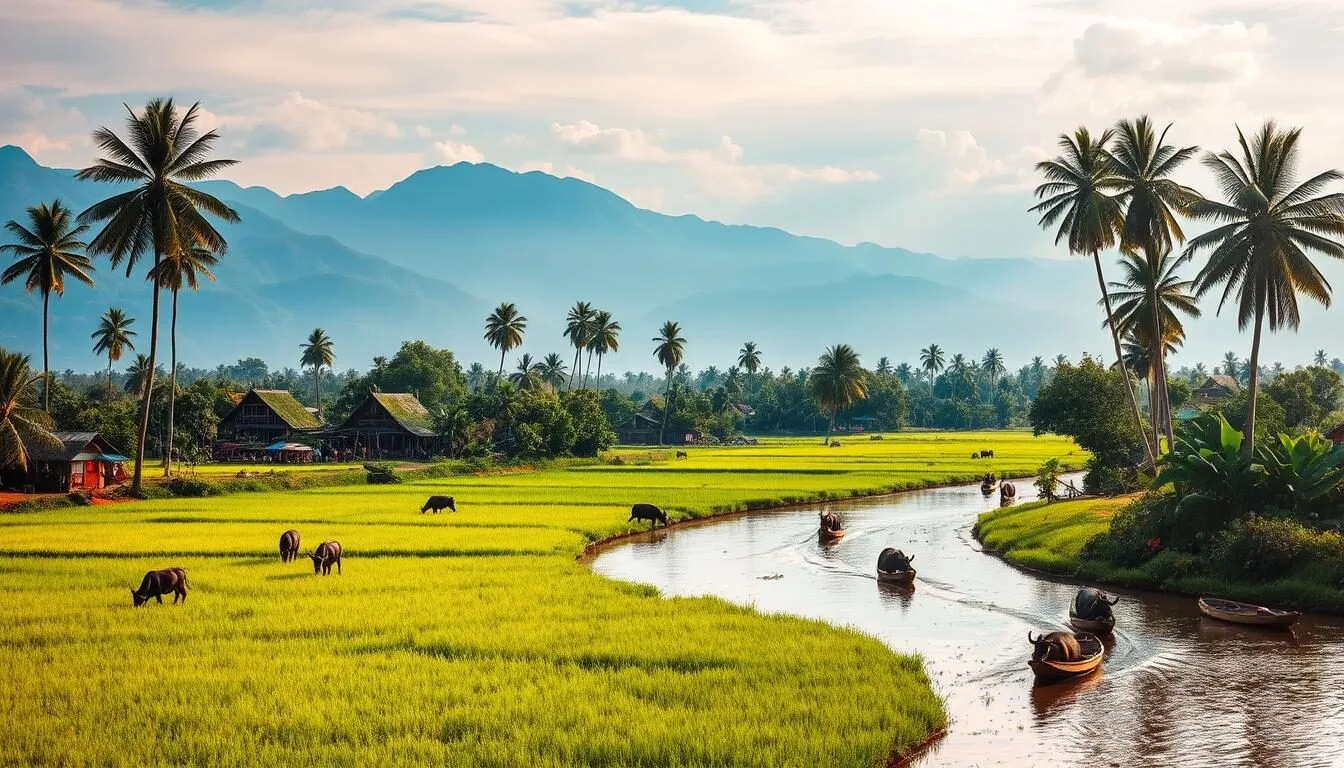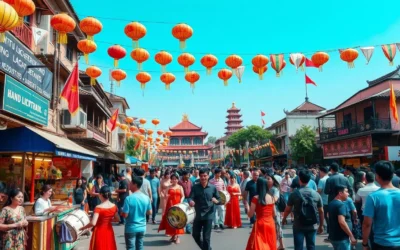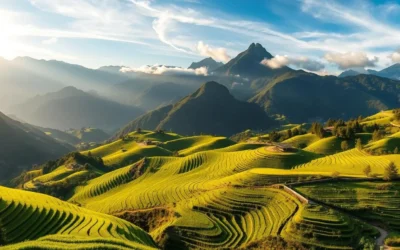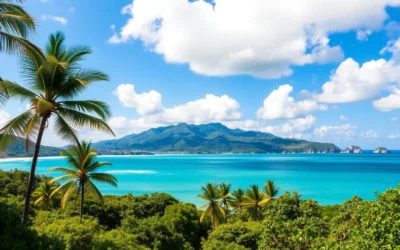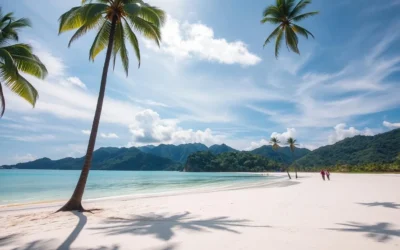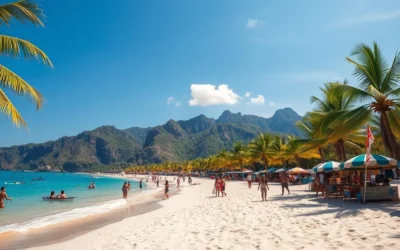✓ Accommodations ✓ Flights ✓ Rental Cars
Imagine cruising along a vast network of rivers and canals, surrounded by lush rice paddies and vibrant local markets. The Mekong Delta region offers a unique blend of natural beauty and rich cultural heritage.
You can experience the authentic local life by visiting bustling floating markets, sampling tropical fruits, and staying in serene homestays. This comprehensive guide will introduce you to the top experiences in the region, helping you plan an unforgettable adventure.
From exploring the intricate waterways to immersing yourself in the local culture, the Mekong Delta promises an adventure like no other. Get ready to create lasting memories of your time in this captivating region.
Discovering the Charm of the Mekong Delta
As you step into the Mekong Delta, you’re immediately immersed in a world of waterways and vibrant local life. The region’s unique charm is deeply rooted in its geography and the significance of the Mekong River system.
The Geography and Significance of the Mekong River System
The Mekong Delta encompasses a vast area in southwestern Vietnam where the mighty Mekong River approaches and empties into the East Sea through a complex network of distributaries. This incredible water system stretches over 33,500 miles long, creating a unique landscape of wetlands, small rivers, and fertile alluvial plains that have shaped the region’s distinctive culture and economy.
| Characteristics | Description |
|---|---|
| Length of Water System | Over 33,500 miles |
| Main Products | Fruits, rice, flowers, and livestock |
| Economic Significance | Produces 70% of Vietnam’s fruit and more than half of the country’s rice |
Best Time to Visit the Mekong Delta
For the best experience, plan your visit during the dry season from November to April when the weather is pleasant and rainfall is minimal, making it easier to explore the waterways and outdoor attractions. The rainy season brings lush green landscapes but can make travel more challenging.
Understanding the geography and seasonal patterns of the Mekong Delta will help you appreciate how deeply intertwined the natural environment is with the cultural practices and daily life you’ll encounter during your visit.
Explore the Vibrant Floating Markets
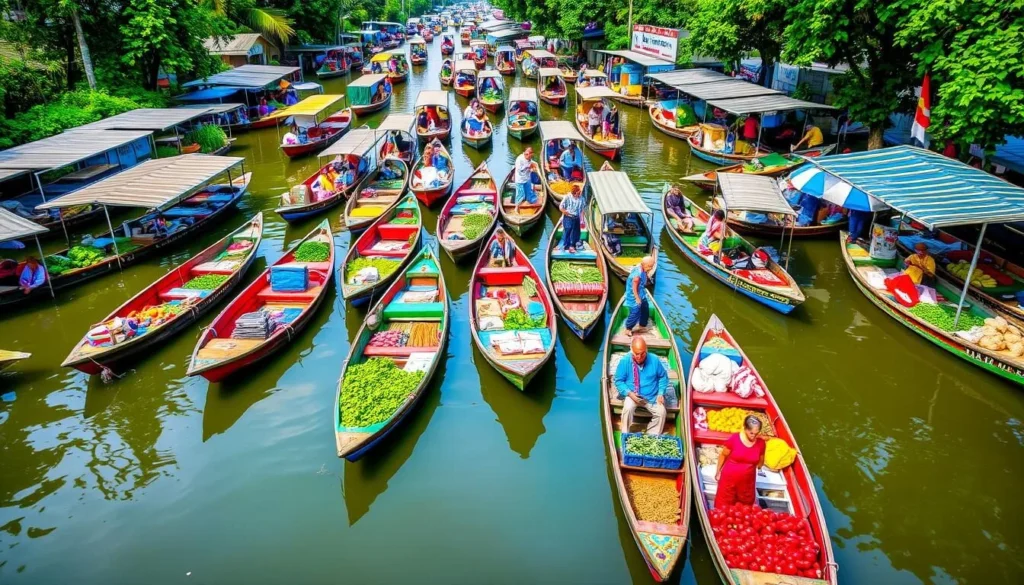
The Mekong Delta’s floating markets are a spectacle like no other, offering a glimpse into a traditional way of life. As you navigate through the delta’s waterways, you’ll encounter vibrant markets where locals gather to exchange goods directly from their boats.
Cai Rang Floating Market: The Largest Wholesale Market
Cai Rang Floating Market near Can Tho is the largest wholesale floating market in the region. Hundreds of wooden boats laden with pineapples, mangoes, dragon fruit, and other produce create a colorful mosaic on the water. To experience Cai Rang at its best, arrive early (around 5 AM) and hire a small boat to weave through the market maze.
Cai Be Floating Market: A Cultural Experience
Cai Be Floating Market offers a more intimate experience with fewer tourists, making it ideal for those seeking authentic cultural interactions and photography opportunities without the crowds. Almost every Mekong Cruise stops here to explore local attractions, providing a unique chance to sample freshly prepared Vietnamese breakfast dishes from floating kitchens.
Tips for Visiting Floating Markets
When visiting any floating market, practical tips include bringing small bills for purchases, wearing a hat and sunscreen, and checking weather forecasts before booking your boat trip. Clearly discussing time and destinations with your boat operator can also help avoid misunderstandings. Consider booking a guided tour that includes transportation from Ho Chi Minh City to simplify logistics.
By following these tips and exploring the floating markets, you’ll gain a deeper understanding of the Mekong Delta’s culture and way of life. The experience will leave you with lasting memories of the region’s vibrant markets and warm hospitality.
Cruise the Mighty Mekong River
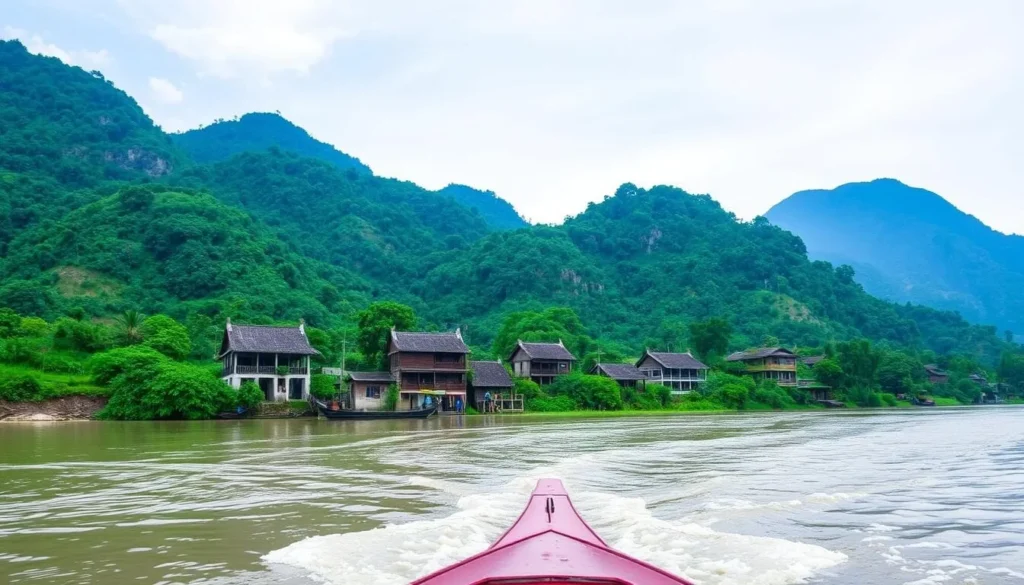
Embark on a journey through the heart of the Mekong Delta with a river cruise that promises unforgettable experiences. Cruising the Mekong River offers a unique perspective on the daily life and rhythms of riverside communities, allowing you to witness the authentic delta life.
Day Cruises vs. Overnight Experiences
You have two main options for exploring the Mekong Delta by water: day cruises that offer a taste of river life in a compact timeframe, or overnight experiences that allow for deeper immersion into the more remote areas of the delta. Day cruises typically depart from Ho Chi Minh City or Can Tho and include visits to floating markets, fruit orchards, and craft villages.
What to Expect on a Mekong Delta Cruise
During your trip, expect to enjoy fresh local cuisine prepared onboard, opportunities to interact with riverside communities, and guided explanations of the ecological and cultural significance of the areas you pass through. Most boat cruises include activities like sampan side-trips down narrow canals, visits to local workshops, and cultural performances that showcase the diversity of delta traditions.
When booking your tour, consider the balance between comfort and authenticity that best suits your travel style, as options range from luxury vessels with air-conditioned cabins to more rustic boats that offer closer contact with local life. Overnight cruises like the Mekong Eye Classic Cruise or Bassac Cruise ($260-300 per person) provide more comprehensive experiences with comfortable accommodations and multiple stops at villages and natural attractions.
Experience Authentic Homestays
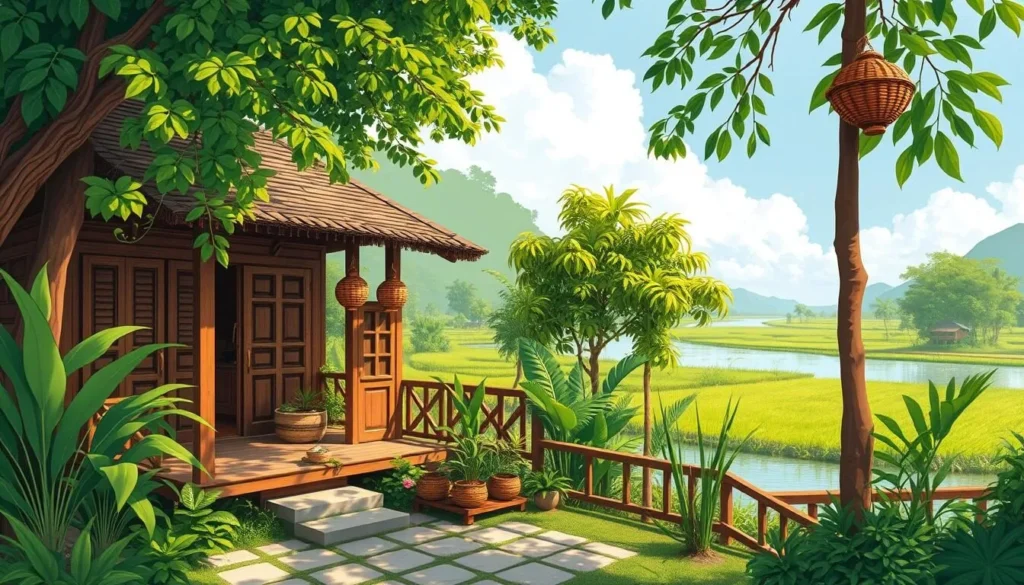
Immerse yourself in the authentic culture of the Mekong Delta by staying with local families in their homestays. This unique experience allows you to live alongside locals and participate in their daily routines, giving you a deeper understanding of life in this vibrant region.
Benefits of Staying with Local Families
Staying at a Mekong Delta homestay offers an immersive cultural experience that hotels can’t match. You’ll enjoy home-cooked meals prepared with fresh local ingredients, learn traditional cooking techniques, and engage in meaningful cultural exchange with your host family.
Most homestays are located on tranquil islands or along peaceful canals, surrounded by fruit orchards and rice fields, creating an authentic rural atmosphere.
Popular Homestay Locations in the Delta
Popular homestay locations include Vinh Long, Ben Tre, and Can Tho provinces. During your stay, you might join activities like helping in the family orchard, learning to make rice paper, or cycling through nearby villages with local guides.
For a seamless experience, consider booking a 2-day Mekong Delta homestay tour that includes transportation, guided activities, and a carefully selected family host. This way, you’ll get to visit Mekong Delta’s hidden gems and enjoy a relaxing day in a serene environment.
Sample Tropical Fruits in Lush Orchards
With its fertile soil and favorable climate, the Mekong Delta is Vietnam’s fruit basket, offering a wide range of tropical fruit. As you explore the region, you’ll have the opportunity to visit numerous orchards and sample the freshest fruit straight from the trees.
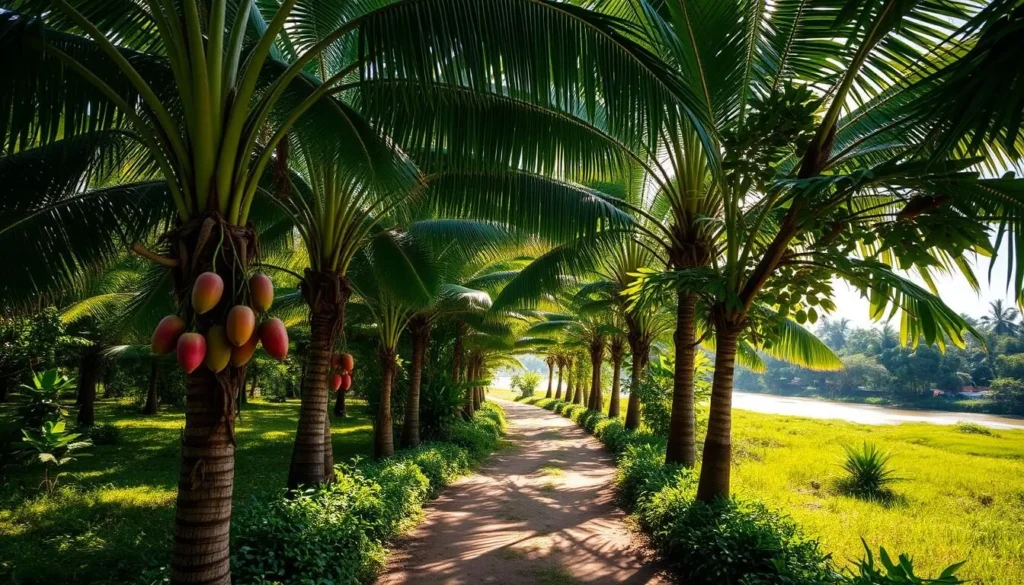
Fruit Buffets in Mekong Delta Orchards
Many orchards in the Mekong Delta offer “all-you-can-eat” fruit buffets for a small entrance fee. You can wander through the groves and sample countless varieties of tropical fruit, including mangosteen, rambutan, longan, jackfruit, dragon fruit, and durian.
| Orchard Location | Provinces | Notable Fruits |
|---|---|---|
| Cai Be | Tien Giang | Mango, grapefruit, guava |
| Vinh Long | Vinh Long | Jackfruit, dragon fruit, mangosteen |
| Ben Tre | Ben Tre | Coconut, banana, mango |
Sa Dec Flower Village and Gardens
While exploring the Mekong Delta, you can also visit the Sa Dec Flower Village, known as the “Flower Capital” of the region. Here, you can stroll among countless varieties of roses, chrysanthemums, and exotic ornamental plants, experiencing the vibrant colors and beauty of the flowers.
When you visit Mekong Delta, be sure to indulge in the local fruit and explore the colorful flower gardens, creating a memorable experience.
Paddle Through Tranquil Canals on a Sampan Boat
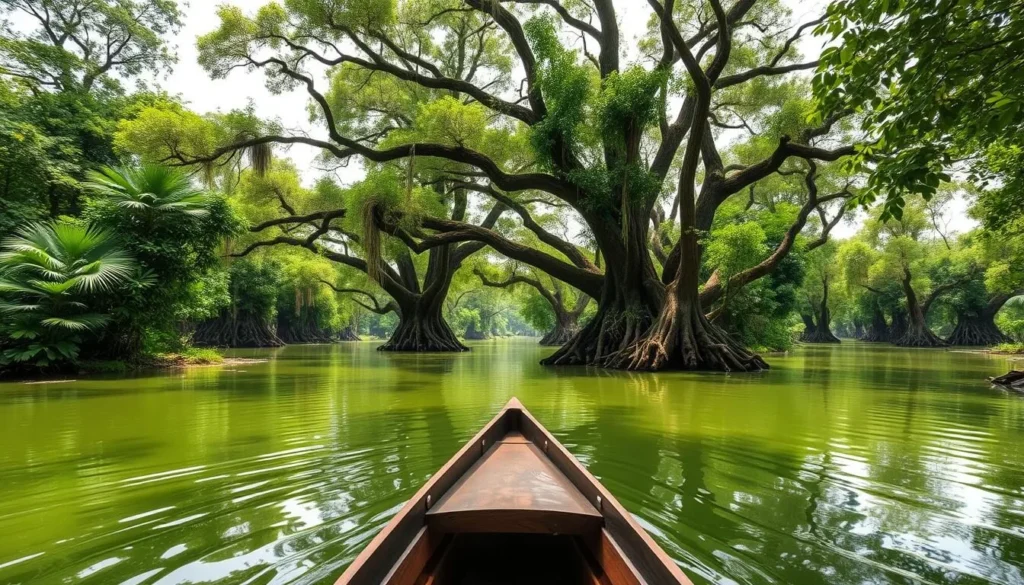
Embark on a peaceful sampan boat trip through the Mekong Delta’s scenic waterways and discover the region’s hidden gems. The Mekong Delta is home to numerous tranquil canals, offering a serene escape from the hustle and bustle of city life.
Tra Su Melaleuca Forest: A Bird Sanctuary
The Tra Su Melaleuca Forest in An Giang is a pristine sanctuary that feels like a journey into another world. As you glide silently through the canals aboard a traditional xuong ba la (three-leaf sampan), you’ll be steered by a friendly local rower who knows every twist and turn. Keep your eyes peeled for flocks of egrets, herons, and shimmering kingfishers darting between branches – a paradise for birdwatchers and photographers alike.
Thi Tuong Lagoon and Other Scenic Waterways
In the Mekong Delta, you can explore several places such as Thoi Son Islet (Ben Tre), Tra Su Cajuput forest (An Giang), and Thi Tuong Lagoon (Ca Mau). The price for a sampan boat trip will be around $3.36 for a small boat that can contain 3 to 4 people, making it an affordable and authentic experience.
The experience of sitting just inches above the water creates a sense of peaceful immersion in the landscape that many travelers describe as meditative and deeply connecting to the natural rhythms of the delta. For the most atmospheric experience, arrange your sampan journey for early morning or late afternoon when the light is golden, temperatures are cooler, and wildlife is most active along the waterways.
Exploring the narrow waterways of the Mekong Delta by sampan boat offers an intimate experience that larger vessels simply can’t provide. A sampan is a traditional flat-bottomed wooden boat steered by a local rower using a single oar, creating a peaceful, engine-free journey that lets you fully appreciate the sounds of nature around you.
Discover Traditional Crafts and Industries
As you explore the Mekong Delta, you’ll discover a world of traditional crafts and industries that have been passed down through generations. The region is home to numerous artisans who continue to practice their crafts using traditional methods, providing a unique glimpse into the region’s rich cultural heritage.
Ben Tre Coconut Candy Workshops
Ben Tre is renowned for its coconut industry, and one of the most delightful experiences here is visiting a traditional coconut candy workshop. You’ll have the opportunity to watch skilled artisans crack coconuts, extract creamy milk, and transform it into a bubbling caramel concoction before your eyes. Many workshops even invite visitors to try their hand at stirring the bubbling mixture or wrapping the finished candies.
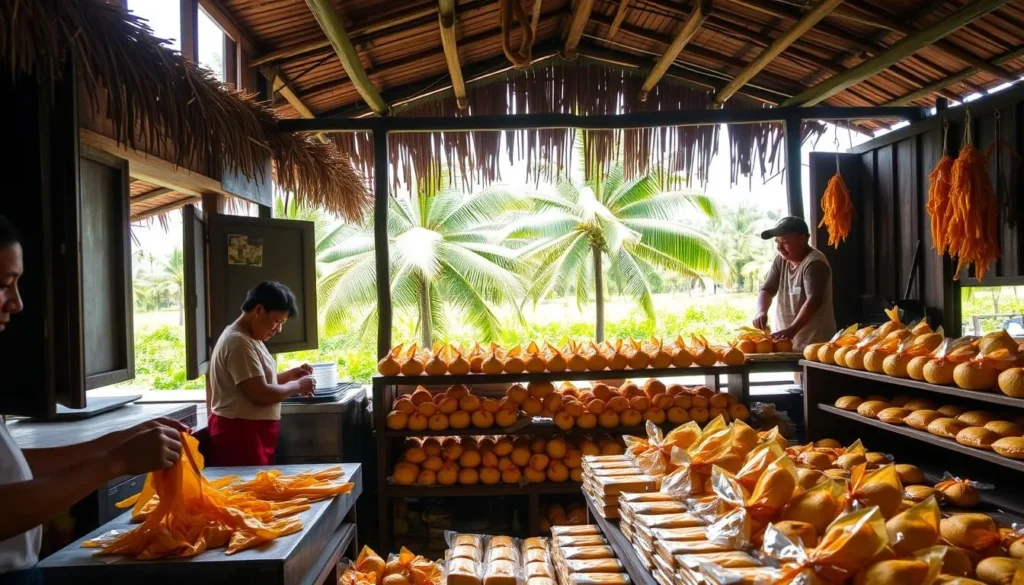
Sa Dec Rice Noodle Making
Sa Dec is famous for its iconic hu tieu – a rice noodle dish that’s a culinary icon of the Mekong Delta. For a truly immersive experience, visit a traditional noodle-making workshop in Sa Dec, where skilled artisans reveal the art behind these delicate strands. You’ll be able to watch as artisans mix rice flour with water, steam the resulting sheets, and skillfully cut them into the delicate strands that form the base of the region’s famous noodle dishes.
Fish Sauce Production in An Giang
If there’s one ingredient that captures the soul of Vietnamese cuisine, it’s definitely nuoc mam – the iconic, aromatic fish sauce found in nearly every dish. And there’s no better place to explore its roots than An Giang, which is considered one of its most authentic birthplaces. Fish sauce production facilities in An Giang offer a fascinating glimpse into the fermentation process of this essential Vietnamese condiment.
These traditional crafts and industries not only preserve cultural heritage but also provide sustainable livelihoods for local communities, making your visit and any purchases you make a way to support the continuation of these traditional skills.
Mekong Delta, Vietnam: Best Things to Do – Top Picks for Culture Lovers
Immerse yourself in the vibrant culture of the Mekong Delta by visiting its iconic temples and pagodas. The region is rich in spiritual heritage, reflecting diverse cultural influences that have shaped the area over centuries.
Ba Chua Xu Temple in Chau Doc
The Ba Chua Xu Pagoda, located at the base of Sam Mountain in Chau Doc, is one of the most sacred sites in the Mekong Delta. Dedicated to the Lady of the Realm, this temple attracts thousands of pilgrims each year, especially during the Ba Chua Xu Festival.
Vinh Trang Pagoda in My Tho
Vinh Trang Pagoda, built in 1849, showcases a unique blend of architectural styles, including Chinese, Vietnamese, Khmer, and European influences. The pagoda features intricate woodwork, mosaic decorations, and various Buddha statues.
Ong Temple and Bat Pagoda
For a unique spiritual experience, visit the Bat Pagoda in Soc Trang, known for its colony of fruit bats. Additionally, Ong Temple in Can Tho, set within the Guangzhou Assembly Hall, offers insights into Chinese religious traditions.
| Temple/Pagoda | Location | Notable Features |
|---|---|---|
| Ba Chua Xu Temple | Chau Doc | Dedicated to the Lady of the Realm, vibrant festivals |
| Vinh Trang Pagoda | My Tho | Blend of architectural styles, intricate decorations |
| Bat Pagoda | Soc Trang | Colony of fruit bats, Khmer-style architecture |
Visiting these spiritual sites offers a glimpse into the life and traditions of the people living in the Mekong Delta region. It’s a way to experience the local culture firsthand, making your trip a memorable one.
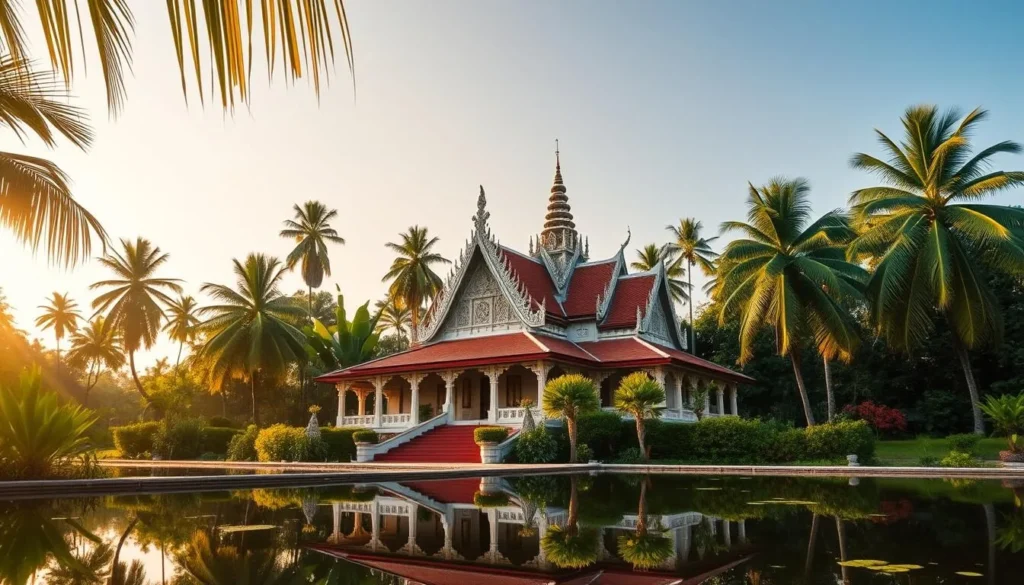
Explore Historical Sites and Architecture
As you explore the Mekong Delta, you’ll uncover a rich tapestry of history through its remarkable historical sites and architecture. The region’s complex past is reflected in its buildings, which blend Vietnamese traditions with French colonial influences and Chinese cultural elements.
Binh Thuy Ancient House
The Binh Thuy Ancient House in Can Tho, built in 1870 by the Duong family, is a national historical relic that beautifully combines French colonial elegance with traditional Vietnamese design. You can admire its five-compartment layout, intricate wooden carvings, and vibrant red-tiled roof, all testaments to meticulous craftsmanship.
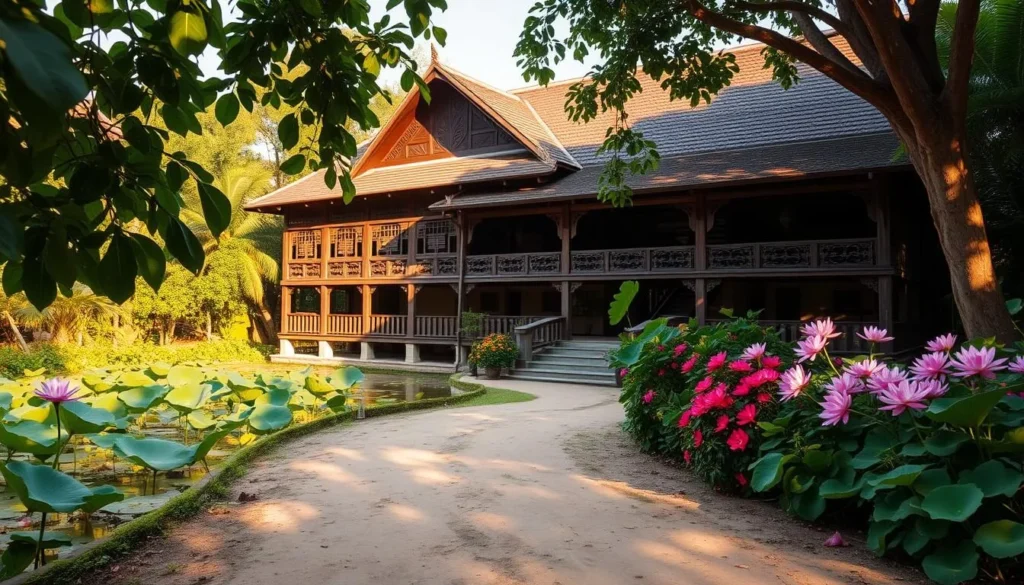
Huynh Thuy Le Old House
In Sa Dec, the Huynh Thuy Le Old House gained international fame through its connection to French author Marguerite Duras, who immortalized her teenage romance with the house’s owner in her novel “The Lover.” This 1895 riverfront mansion showcases Sino-French design with elaborate interior woodwork and stained glass windows.
The Mansion of Bac Lieu’s Playboy
The Mansion of Bac Lieu’s Playboy, also known as Cong Tu Bac Lieu House, offers a glimpse into the extravagant lifestyle of Tran Trinh Huy, a wealthy landowner whose flamboyant personality has become part of local folklore. This French-inspired mansion, built in the early 20th century, is a window into the opulent past of the Mekong Delta.
| Historical Site | Location | Notable Features |
|---|---|---|
| Binh Thuy Ancient House | Can Tho | Five-compartment layout, intricate wooden carvings |
| Huynh Thuy Le Old House | Sa Dec | Sino-French design, stained glass windows |
| Cong Tu Bac Lieu House | Bac Lieu | French-inspired architecture, extravagant decor |
These historical houses not only showcase architectural beauty but also provide insights into the social history of the Mekong Delta during the late 19th and early 20th centuries. Most of these sites are open daily to visitors for modest entrance fees, with some offering guided tours that bring their fascinating stories to life.
Immerse in Natural Wonders
Immersing yourself in the Mekong Delta’s natural wonders is an experience that will leave you in awe of Vietnam’s diverse ecosystems. The region is home to remarkable natural ecosystems that showcase Vietnam’s biodiversity, from wetlands and flooded forests to national parks that protect endangered species and unique habitats.
Tram Chim National Park: Home to Rare Birds
Tram Chim National Park in Dong Thap province is a biodiversity hotspot, spanning over 7,500 hectares and serving as a sanctuary for 233 bird species, including the rare and endangered Eastern Sarus Crane. The park’s unique seasonal cycle, shifting from flooded plains to dry grasslands, supports over 130 plant species and a rich variety of aquatic life, making it a paradise for birdwatchers and wildlife photographers.
Tan Lap Floating Village and Cajuput Forest
Tan Lap Floating Village and Cajuput Forest in Long An province offer a serene experience, with elevated wooden pathways through a pristine melaleuca forest. The still water creates mesmerizing mirror images of the trees, and during November, the lotus flowers bloom, adding vibrant pink contrasts to the landscape.
Xeo Quyt Forest: A Historical Nature Reserve
Xeo Quyt Forest is not only a natural wonder but also a historical site, having served as a secret Viet Cong base during the American War. Today, visitors can explore the forest by canoe on a 20-minute tour, winding through narrow waterways and passing former bunkers, offering glimpses into the area’s wartime history alongside its natural splendor.
| Natural Wonder | Location | Key Features |
|---|---|---|
| Tram Chim National Park | Dong Thap | 233 bird species, seasonal transformation |
| Tan Lap Floating Village | Long An | Cajuput forest, lotus blooms |
| Xeo Quyt Forest | Dong Thap | Historical significance, canoe tours |
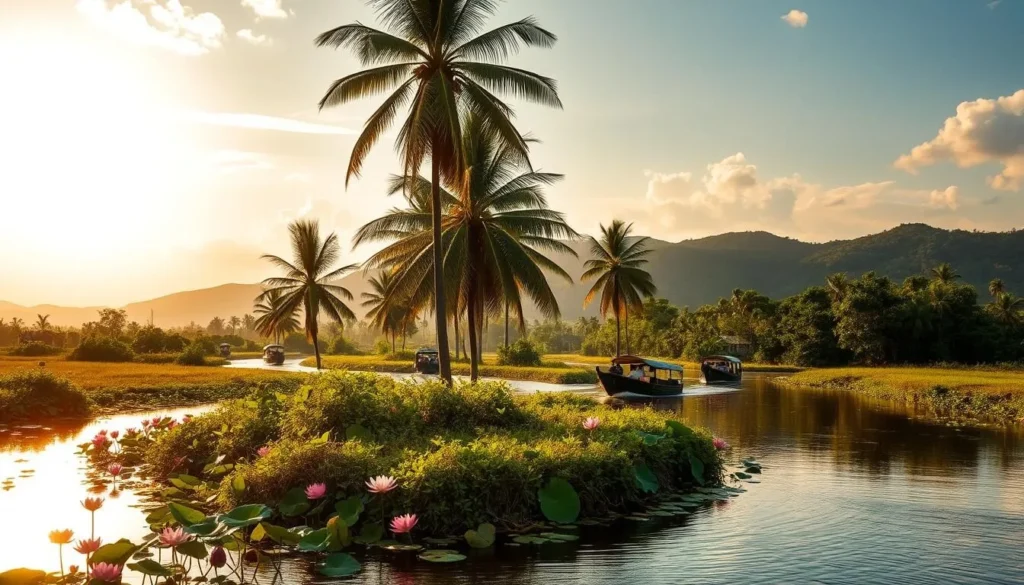
The Mekong Delta’s natural wonders offer more than just scenic beauty; they provide a peaceful escape and insights into the region’s unique ecosystems and history. As you explore these areas, you’ll experience the tranquility of the river and the richness of Vietnam’s natural heritage.
Savor Authentic Mekong Delta Cuisine
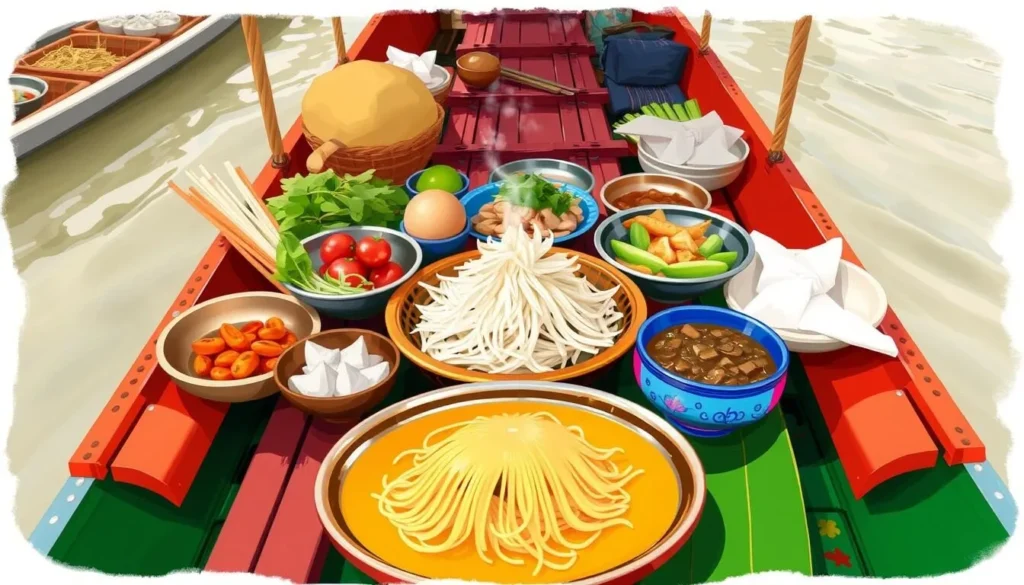
Savoring the authentic cuisine of the Mekong Delta is a must-do experience, with its unique blend of fresh ingredients and traditional cooking methods. The region’s cuisine is a vibrant reflection of its abundant natural resources, with fresh ingredients from its rivers, rice fields, and orchards coming together in dishes that are distinctively different from those found in other regions of Vietnam.
Must-Try Local Dishes and Delicacies
The Mekong Delta offers a variety of delicious dishes, including bun rieu (crab noodle soup) and hu tieu (clear rice noodle soup with pork and seafood), which can be enjoyed at the floating markets. Other must-try specialties include banh xeo (crispy rice pancakes filled with bean sprouts, shrimp, and pork) and canh chua ca (sour fish soup with pineapple, tomato, and elephant ear plant).
Where to Find the Best Food in the Delta
For an authentic dining experience, visit markets like Hang Bong in My Tho, famous for banh beo rice cakes, or restaurants such as Chu5 Hoa in My Tho, renowned for hu tieu. Enjoy a meal at a riverside restaurant in Can Tho or on a boat in one of the floating markets, where the setting enhances the connection between the food and its source.
The best time for culinary exploration is early morning at floating markets or evening at night markets, where you can enjoy fresh seafood and local delicacies.
Experience Local Festivals and Cultural Events
Immerse yourself in the Mekong Delta’s unique cultural landscape by participating in the region’s colorful festivals and events. The Mekong Delta is known for its rich cultural heritage, blending Vietnamese, Khmer, Chinese, and Cham influences into unique celebrations that offer visitors a window into the region’s diverse traditions.
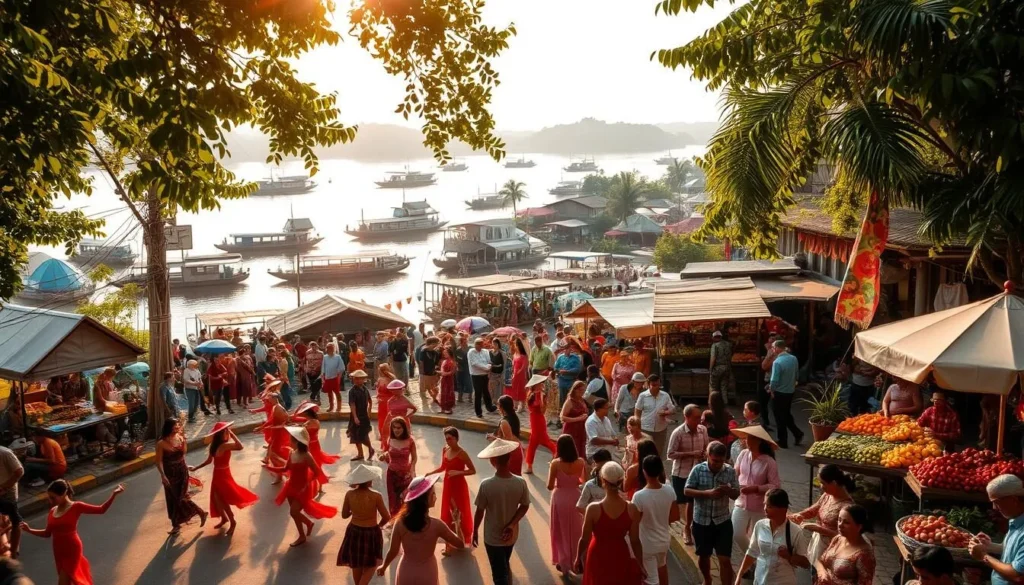
Ok Om Bok Festival: Moon Worship and Boat Races
The Ok Om Bok Festival, celebrated by the Khmer community in Tra Vinh province around mid-November, is a significant cultural event that combines moon worship ceremonies with thrilling boat races. During this festival, witness the spectacular Ghe Ngo boat races, where serpent-shaped vessels powered by teams of 40-50 rowers compete in a colorful display of strength and teamwork, honoring both the Moon God and the Water God.
Don Ca Tai Tu: UNESCO-Recognized Folk Music
Don Ca Tai Tu, a soulful folk music tradition that originated in the Mekong Delta, is recognized by UNESCO as an Intangible Cultural Heritage of Humanity. Experiencing a Don Ca Tai Tu performance, with its poetic lyrics and distinctive instruments like the dan tranh (16-string zither) and dan bau (monochord), offers insight into how music serves as both entertainment and a way of preserving cultural stories and emotions.
Other significant cultural events in the Mekong Delta include Chol Chnam Thmay (Khmer New Year) in April, featuring temple visits and traditional games, and various fruit festivals celebrating the harvest of specialties like longan, rambutan, and durian throughout the year. Local cultural centers in Can Tho, Vinh Long, and other provincial capitals often host regular performances of traditional music, dance, and theater that visitors can attend for a modest fee.
When visiting the Mekong Delta during festival times, consider arranging your itinerary to include smaller community celebrations, which often provide more authentic experiences and opportunities to interact with locals celebrating their cultural heritage. By doing so, you’ll gain a deeper understanding of the region’s cultural practices and create meaningful memories of your visit to the Mekong Delta.
Planning Your Perfect Mekong Delta Adventure
To make the most of your visit to the Mekong Delta, it’s essential to plan your itinerary carefully, considering the time of year and your interests. You can choose from various tour options, including day trips from Ho Chi Minh City or longer, more immersive experiences.
For travelers with limited time, a day trip to areas like My Tho or Ben Tre is a great introduction to delta life. Those with more time can consider overnight tours that include visits to floating markets, such as Cai Rang, and exploration of the delta’s cultural sites. With 2-3 days, you can experience the early morning markets and delve deeper into the region’s waterways.
When planning your trip, consider the best seasons to visit: the dry season (November-April) for easier travel or the early wet season (May-July) for lush landscapes and abundant fruit harvests. Pack accordingly with lightweight clothing, sun protection, and waterproof bags. Most tours depart from Ho Chi Minh City early in the morning, so plan to arrive in the city a day before to ensure a smooth start.
By choosing the right tour or travel style, you can have a rich and fulfilling experience in the Mekong Delta, enjoying its unique culture, delicious cuisine, and breathtaking landscapes.
The above is subject to change.
Check back often to TRAVEL.COM for the latest travel tips and deals.
